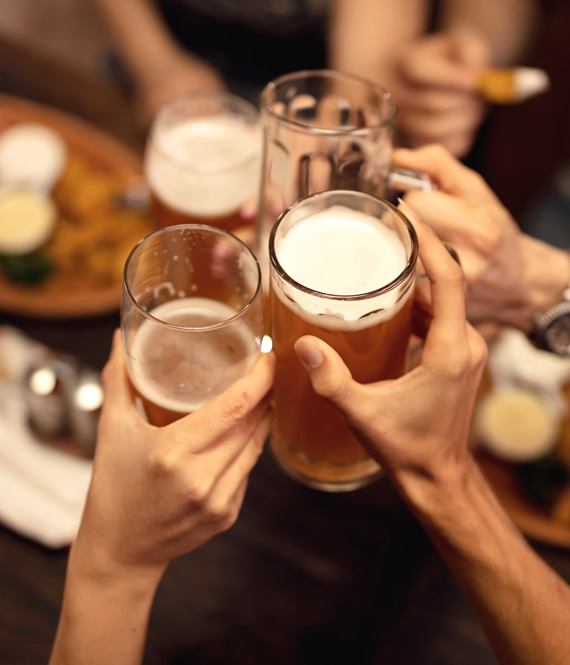
Eating Disorders and Addiction: Unearthing Hope & the Journey Towards Recovery
We recommend helpful products in our articles. Read our full disclosure here. The content on this website is not intended to be a substitute for professional advice, diagnosis, or treatment.
Is there a connection between eating disorders and addiction?
In today’s fast-paced society, eating disorders have become a pervasive health issue that individuals of all ages can experience.
These conditions, intricately linked to our relationship with food, can precipitate drastic, often negative changes in our bodies, sometimes even leading to life-threatening situations.
Interestingly, the ramifications of these disorders may not stop with our physical health; they can also pave the way for addiction.
Hence, it’s crucial to never ignore the tell-tale signs of eating disorders such as anorexia, binge eating, bulimia, and more.
These unhealthy eating habits can gradually deteriorate our overall well-being.
In this article, we delve into the often-overlooked connection between eating disorders and addiction.
We will take a look at how these two afflictions influence each other, how they manifest, and what can be done to make the situation better.
The Addictive Nature of Eating Disorders
Just like substance abuse, eating disorders can create a cycle of reward and punishment that can be difficult to break free from.
This cycle often begins as a coping mechanism to deal with stress, anxiety, or depression, and can quickly become an addiction in and of itself.
Hence, seeking professional help early can make a big difference in the recovery process.
The Intricate Connection Between Eating Disorders And Addiction
At first glance, eating disorders and addiction might seem like two entirely distinct health issues.
However, upon closer inspection, their commonalities begin to surface.
For instance, an individual struggling with an eating disorder might resort to self-medicating with drugs without medical supervision.
This act of self-medication could potentially escalate into dependency and subsequently, addiction.
Furthermore, certain drugs may inadvertently exacerbate an individual’s eating disorder by suppressing appetite or alleviating food-related anxiety and stress.
Spotlight on Common Eating Disorders
Eating disorders come in many forms, each unique in its symptoms and impacts.
However, three types are notably more prevalent: anorexia nervosa, bulimia nervosa, and binge eating.
Anorexia nervosa
Anorexia nervosa predominantly affects adult women and is characterized by an extreme fear of gaining weight, irrespective of one’s actual body mass.
This fear is often fueled by a distorted perception of self-image, leading to limited food intake and consequently, an unhealthy body weight.
Binge eating
In stark contrast to anorexia, binge eating involves consuming unusually large amounts of food, often surpassing what an average individual would eat in a sitting.
For instance, a person who can finish an entire pizza or cake in under 30 minutes might be exhibiting signs of this disorder.
This lack of control over eating can lead to significant health issues, as it often persists despite feelings of fullness.
Bulimia nervosa
Bulimia nervosa combines elements of binge eating with extreme measures to avoid weight gain.
These measures might include self-induced vomiting, excessive exercise, fasting, or the unnecessary use of laxatives.
Signs and Symptoms of Eating Disorders
Knowing the signs and symptoms of eating disorders is paramount to early detection and intervention.
These may include the following manifestations.
- An intense preoccupation with dieting, food, body size, and weight;
- Skipping meals, restricting calorie intake, or only eating specific ‘safe’ foods;
- Binge eating, usually followed by purging behaviors like vomiting, fasting, or excessive exercise.
- Evidence of overeating, or undereating such as disappearing, large quantities of food.
- Unusually high levels of distress around meal times.
- Social withdrawal, especially from activities involving food.
- Noticeable fluctuations in weight, both gains and losses.
Unpacking the Causes of Eating Disorders
Eating disorders don’t arise from a singular cause or trigger.
Decades of research have unearthed a myriad of contributing factors, often linked to mental health, body image perceptions, and environmental influences.
1. Mental health
Common eating disorders often coincide with other mental health conditions that adults might grapple with, including depression, anxiety, low self-esteem, and societal stressors such as bullying and peer pressure.
2. Body image perceptions
Body image plays a significant role in the onset of eating disorders.
One’s perception of their own body can greatly influence their eating habits.
Factors such as childhood gastrointestinal conditions, body dissatisfaction, weight concerns, and the desire for a thin figure can precipitate eating disorders and addiction.
3. Environmental influences
A person’s environment can also contribute to the development of an eating disorder.
For example, the dynamics within a family or home environment can greatly affect an individual’s attitude toward food.
Additionally, the surrounding environment can also impact one’s mental health, either positively or negatively.
The Good News – Eating Disorders are Treatable
Remember, both eating disorders and addiction are treatable, and recovery is possible.
With the right treatment plan, which often includes psychological therapy, nutritional counseling, and sometimes medication, individuals can regain control over their habits and return to a healthier way of life.
Here are a few core things that can help the struggling person, and the people around them in this challenging situation.
Support Network
In battling eating disorders and addiction, strong support networks are essential.
These networks could include family, friends, or professional mental health services.
Encouraging open conversations about struggles, feelings, and progress can lead to better understanding and a greater sense of belonging and acceptance.
Self-Compassion
While dealing with eating disorders and addiction, or helping someone to deal with them, it is essential to practice self-compassion.
Understand that these conditions are not reflective of anyone’s weakness or failure.
It is crucial to be kind and patient with oneself throughout the process.
Body Positivity
It’s important to foster an environment that celebrates body positivity and diversity.
Emphasizing that worth is not determined by physical appearance can be a powerful tool in combating eating disorders and addiction.
Reinforce the idea that everyone is unique, and there is no ‘perfect’ body type.

Mindfulness and Emotional Intelligence
Learning to be mindful of one’s eating habits and the emotions associated with them can be a useful strategy in managing eating disorders.
Mindfulness can help individuals become more aware of their relationship with food, identify triggers for unhealthy behaviors, and devise strategies to manage these triggers.
If You Struggle With Eating Disorders and Addiction
Remember, if you struggle with eating disorders and addiction, you’re not alone in this fight.
Reach out to health professionals who are equipped to provide guidance and support throughout the recovery journey.
There are numerous resources available both online and offline that can provide valuable help and advice in between your doctor visits.
Do not wait until your problems get worse.
You deserve to live a healthy and happy life.
Eating Disorders and Addiction: Conclusion
As we conclude our exploration of the intricate connection between eating disorders and addiction, it’s crucial to acknowledge the complexity of these disorders.
They’re not just about food or substances.
They’re often about pain, control, or self-worth.
Understanding the roots of these disorders is only the first step toward healing.
Remember, you are not defined by your struggles, and it’s okay to ask for help.
Nobody should have to face these battles alone, and it’s important to seek support from friends, family, or mental health professionals.
The journey toward recovery may seem daunting, and it’s okay if progress feels slow.
Each step forward, no matter how small, is a victory worth celebrating.
Moreover, practice self-compassion throughout your journey.
It’s easy to slip into self-criticism but remember that healing takes time, and it’s okay to have setbacks.
What’s important is to pick yourself up, be gentle with yourself, and continue moving forward.
Promote body positivity, and remember, there is no “perfect” body type.
Each of us is unique, and we must celebrate that diversity.
Health and happiness can come in all shapes and sizes, and they are not dictated by societal pressures or unrealistic beauty standards.
Lastly, invest in your emotional intelligence and mindfulness.
Recognizing and understanding your emotions can be a powerful tool in managing triggers and changing unhealthy behaviors.
Mindful eating and mindfulness-based therapies can help you reconnect with your body’s signals of hunger and fullness, breaking the cycle of dieting and bingeing.
In the battle against eating disorders and addiction, remember to be patient, be kind to yourself, and most importantly, never lose hope.
"We love to research problems, examine studies, analyze solutions, and share with you ideas that make life healthier. You can learn about us and our editorial standards here. Have suggestions or feedback to share? Send us a message!."













Leave a Comment